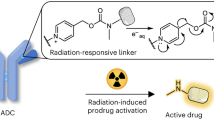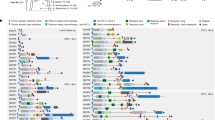Abstract
The interaction between moderate-dose radiation and cisplatin or carboplatin was studied in a cisplatin-sensitive (GLC4) and -resistant (GLC4-CDDP) human small-cell lung cancer cell line. Cellular toxicity was analysed under oxic conditions with the microculture tetrazolium assay. For the platinum and radiation toxicity with the clinically relevant dose ranges applied, this assay was used to obtain information on cell survival after the treatments. Apart from effects on cell survival effects on DNA were also investigated. Configurational DNA changes could be induced by platinum drugs and thereby these drugs might change the frequency of DNA double-strand breaks (dsbs). DNA fragmentation assayed with the clamped homogeneous electric field (CHEF) technique was used as a measure for dsbs in DNA. The radiosensitising effect of the platinum drugs was expressed as enhancement ratio (ER) calculated directly from survival levels of the initial slope of the curve. The highest ER for cisplatin in GLC4 was 1.39 and in GLC4-CDDP 1.38. These were all at 75% cell survival. Carboplatin showed increased enhancement with prolonged incubation up to 1.21 in GLC4 and was equally effective as cisplatin in GLC4-CDDP. According to isobologram analysis, prolonged incubation with both platinum drugs showed at least additivity with radiation for both cell lines at clinically achievable doses. GLC4-CDDP showed cross-resistance to radiation. The radiosensitising capacity of both lung cancer cell lines was not dependent on their platinum sensitivity. The formation of dsbs in DNA directly after radiation was not influenced by pretreatment of either drug in the sensitive or in the resistant cell line. Drug treatment resulted in decreased DNA extractability in control as well as in irradiated cells. Modest enhancement ratio for radiosensitisation by platinum drugs cannot be explained on the level of dsb formation in DNA in both cell lines. Interaction of radiation with the clinically less toxic carboplatin can be improved by prolonged low-dose carboplatin exposure before irradiation and is as potent as cisplatin in the resistant lung cancer cell line. This suggests an advantage in combining radiation and carboplatin in lung cancer patients.
This is a preview of subscription content, access via your institution
Access options
Subscribe to this journal
Receive 24 print issues and online access
$259.00 per year
only $10.79 per issue
Buy this article
- Purchase on Springer Link
- Instant access to full article PDF
Prices may be subject to local taxes which are calculated during checkout
Similar content being viewed by others
Author information
Authors and Affiliations
Rights and permissions
About this article
Cite this article
Groen, H., Sleijfer, S., Meijer, C. et al. Carboplatin- and cisplatin-induced potentiation of moderate-dose radiation cytotoxicity in human lung cancer cell lines. Br J Cancer 72, 1406–1411 (1995). https://doi.org/10.1038/bjc.1995.522
Issue Date:
DOI: https://doi.org/10.1038/bjc.1995.522
This article is cited by
-
Phase II trial of docetaxel, cisplatin and fluorouracil followed by carboplatin and radiotherapy in locally advanced oesophageal cancer
British Journal of Cancer (2007)
-
Phase I study of cisplatin and irinotecan combined with concurrent hyperfractionated accelerated thoracic radiotherapy for locally advanced non-small cell lung carcinoma
International Journal of Clinical Oncology (2005)
-
Expression of apoptosis-related proteins and morphological changes in a rat tumor model of human small cell lung cancer prior to and after treatment with radiotherapy, carboplatin, or combined treatment
Virchows Archiv (2003)



